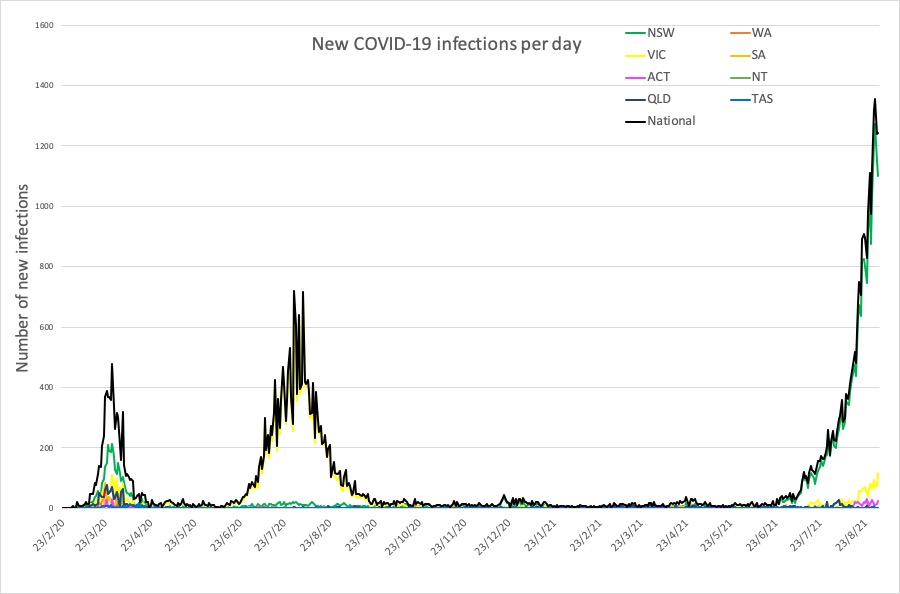And the risk of breakthrough covid infection after two doses is just 0.2%.
Welcome to The Medical Republic’s COVID Catch-Up.
It’s the day’s covid-19 news in one convenient post. Email bianca@biancanogrady.com with any tips, comments or feedback.
2 September
- Large randomised controlled trial finds lower incidence of covid with more mask use.
- Risk of breakthrough infection just 0.2% after two vaccine doses, study finds.
- Victorian campaign to increase influenza vaccine uptake in healthcare workers boosts coverage.
- Assessing long covid risk in children is complicated, study finds.
- Glucocorticoids reduce vaccine seroconversion rate in patients with chronic inflammatory disease.
- Birth rates drop globally during the pandemic.
- Fewer deaths from covid in latest Australian outbreak compared to previous outbreaks.
- Latest on the covid vaccine rollout in Australia.
- Latest covid infection numbers from around Australia.
A large randomised, controlled trial of mask-wearing has found the use of surgical masks was associated with an 11% reduction in the overall incidence of covid, and a 35% reduction in those aged over 60 years.
The unpublished study, which is not yet peer-reviewed, cluster-randomised more than 335,000 individuals in Bangladesh to an intervention designed to increase mask-wearing – either cloth or surgical masks –which included the provision of free masks, or to a control arm of no intervention. The randomisation was done by village, to study the effects across entire communities rather than in individuals.
The intervention tripled the number of people seen wearing facemasks during the study, and was associated with an overall 9.3% reduction in symptomatic SARS-CoV-2 infection. The reduction was even greater among those wearing surgical masks, and among those aged over 60 years.
The authors commented that the effect on infection rates would likely be several times larger if more people wore masks. “Where achievable, universal mask adoption is likely to have still larger impacts,” they wrote.
Meanwhile, the National Asthma Council has issued a reminder that face-masks are not only safe for people with asthma, but can help reduce their disproportionately high risk of severe outcomes from covid.
In a statement, National Asthma Council Australia director Dr Peter Wark said there was no evidence that face-masks posed a risk for people with asthma. However, if people do experience a feeling of breathlessness while wearing a mask, he suggested moving to an open area with good airflow to briefly remove their mask until they catch their breath.
The risk of breakthrough covid infection after two doses of covid vaccine is around 0.2%, but higher among the frail elderly, according to a study in Lancet Infectious Diseases.
The prospective case-control study involved more than 2.2 million adults in the UK – 56% of whom had received a first dose of covid vaccine and the remainder who had received two doses.
Overall, 0.5% of those who had received one dose of vaccine reported testing positive for SARS-CoV-2 at least two weeks after the vaccination, and 0.2% of those who had received two doses tested positive at least seven days after their second dose.
However nearly a quarter of the 130 frail older adults in the study who had received one dose of vaccine presented to hospital after testing positive for SARS-CoV-2. Only two of the 36 (6%) who had received their second dose tested positive.
The study also found a halving of the risk of long covid among those who experienced breakthrough infection after two doses of vaccine, and there was a higher proportion of asymptomatic infections among those who were fully vaccinated.
Three-quarters of Victorian healthcare facilities achieved at least 90% influenza vaccination coverage of staff during a 2020 campaign to increase influenza vaccine uptake, despite vaccination not being mandatory in most settings.
A report in Communicable Diseases Intelligence presents data on influenza vaccine coverage in Victorian hospitals during 2020, which found that even among the facilities that didn’t achieve at least 90% coverage, median coverage was around 85%.
Uptake was even higher in smaller health facilities – those with fewer than 500 healthcare workers had a median of 98.7% coverage – and it was also higher in rural compared to metropolitan facilities.
State targets for influenza vaccine coverage among hospital staff in Victoria increased from 75% in 2018 to 90% in 2020. Last year there was also a concerted push to increase vaccine coverage in hospitals: one-third of facilities include vaccination in employment contracts and another third mandate it for staff.
Can children get long covid? A study has attempted to answer this but with mixed results, finding persistent symptoms both in children with covid and those without.
The non-peer-reviewed preprint study published on Research Square surveyed just over 3000 children aged 11-17 years, who tested positive for SARS-CoV-2, and 3700 age- and sex-matched covid-negative controls.
At the time of SARS-CoV-2 testing, 35% of those who tested positive had symptoms – most commonly sore throat, headache, tiredness and loss of smell – compared to 8% of those who tested negative.
Three months later, 66% of those who tested positive and 53% of those who tested negative reported any symptoms, and 30% of test-positives and 16% of test-negatives reported three or more symptoms. The most common symptoms reported among both the positive cases and negative controls were tiredness and headache, although the prevalence of headache and fatigue was higher among those who had experienced covid.
The study found no difference between the two groups in mental health, wellbeing or fatigue scores.
“The findings emphasise the importance of incorporating a comparator matched cohort of test-negative CYP [children and young people] who have contemporaneously experienced a pandemic, school closure and social isolation,” the authors wrote. However they said their and other studies did provide evidence that some teenagers do experience persistent symptoms after testing positive for SARS-CoV-2.
Patients treated with glucocorticoids or B-cell depletion therapy for chronic inflammatory disease may have a reduce immune response to vaccination with mRNA covid vaccines.
A prospective study published in the Annals of Internal Medicine compared antibody responses to mRNA vaccines in 133 individuals with chronic inflammatory diseases such as inflammatory bowel disorder and rheumatoid arthritis, and in 53 immunocompetent participants.
All the immunocompetent participants and nearly 89% of those with chronic inflammatory disease seroconverted after vaccination. However the level of seropositivity was significantly lower among those being treated with prednisone, and antibody levels were lower in those on glucocorticoids or B-cell depletion therapies such as rituximab.
Just as occurred during the 1918 influenza pandemic, the SARS-CoV-2 pandemic is associated with a global drop in birth rates, although the effects vary enormously between countries and regions.
A paper in PNAS presents an analysis of crude birth rates across 22 high-income countries which found that birth rates declined in 13 of them. Hungary saw an 8.5% drop, Italy a 9.1% drop and Spain an 8.4% drop. However birth rates trended towards the positive in South Korea, the Scandinavian nations, Germany, The Netherlands and Switzerland.
In comparison, the 1918 influenza pandemic was associated with a 13% drop in birth rates in the United States, whereas during the SARS-CoV-2 birth rates have declined by a non-significant 3.8%.
More than 1000 Australians have died of covid; just over 100 in this in the latest outbreak.
There is one glimmer of hope: number of deaths in the latest outbreak appears to be tracking lower than in the first two:
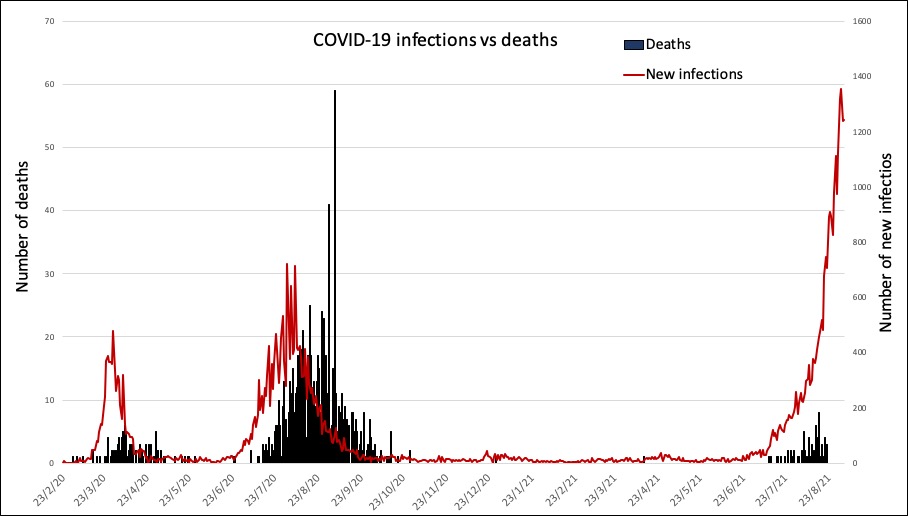
Here’s the latest on the covid vaccine rollout around Australia.
As of 31 August, 35.74% of Australians aged over 16 years have had two doses of vaccine, and 23.88% have had their first dose of vaccine, leaving 38.58% as-yet unvaccinated. The best news is nearly two-thirds of those aged over 70 years are now fully vaccinated, and only 12% haven’t received any vaccines:
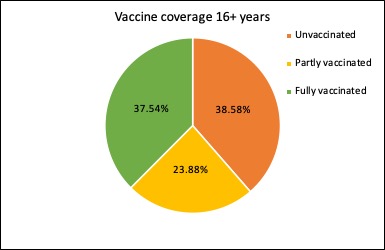
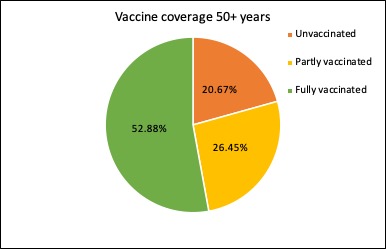
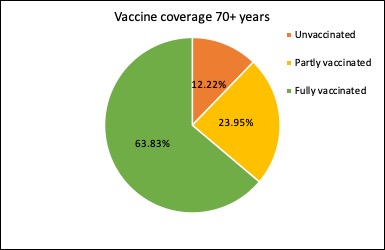
This is the breakdown by five-year age groups. The federal Department of Health isn’t yet providing figures for vaccinations in the 12-15-year group, but hopefully that will start coming through soon:
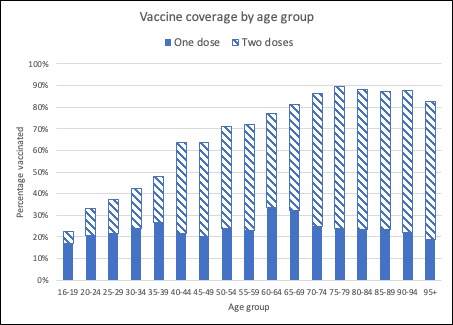
Here are the latest covid infection numbers from around Australia to 9pm Wednesday:
National – 55,093 with 1012 deaths
ACT – 421 (23)
NSW – 28,111 (1102)
NT – 202 (0)
QLD – 1980 (1)
SA – 871 (1)
TAS – 235 (0)
VIC – 22,187 (116)
WA – 1086 (0)
